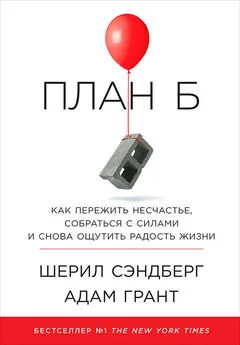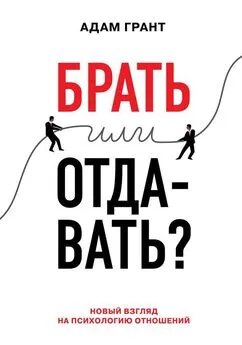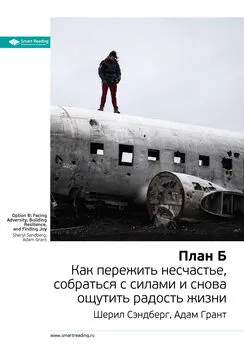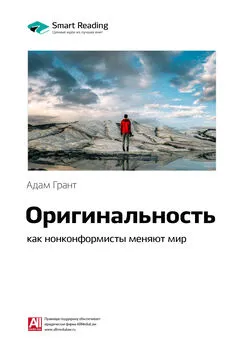Адам Грант - Подумайте еще раз. Сила знания о незнании
- Название:Подумайте еще раз. Сила знания о незнании
- Автор:
- Жанр:
- Издательство:Манн, Иванов и Фербер
- Год:2021
- Город:Москва
- ISBN:9785001698531
- Рейтинг:
- Избранное:Добавить в избранное
-
Отзывы:
-
Ваша оценка:
Адам Грант - Подумайте еще раз. Сила знания о незнании краткое содержание
Для всех, кто хочет научиться критически оценивать реальность и свои решения, переосмысливать и переучиваться, двигаясь вперед.
Подумайте еще раз. Сила знания о незнании - читать онлайн бесплатно ознакомительный отрывок
Интервал:
Закладка:
390
Asahina Robert, «The Inquisitive Robert Nozick», New York Times, September 20, 1981, www.nytimes.com/1981/09/20/books/the-inquisitive-robert-nozick.html.
391
Ken Gewertz, «Philosopher Nozick Dies at 63», Harvard Gazette, January 17, 2002, news.harvard.edu/gazette/story/2002/01/philosopher-nozick-dies-at-63; see also Hilary Putnam et al., «Robert Nozick: Memorial Minute», Harvard Gazette, May 6, 2004, news.harvard.edu/gazette/story/2004/05/robert-nozick.
392
Joachim Stoeber and Kathleen Otto, «Positive Conceptions of Perfectionism: Approaches, Evidence, Challenges», Personality and Social Psychology Review 10 (2006): 295–319.
393
Dana Harari et al., «Is Perfect Good? A Meta-analysis of Perfectionism in the Workplace», Journal of Applied Psychology 103 (2018): 1121–44.
394
Philip L. Roth et al., «Meta-analyzing the Relationship between Grades and Job Performance», Journal of Applied Psychology 81 (1996): 548–56.
395
Adam Grant, «What Straight-A Students Get Wrong», New York Times, December 8, 2018, www.nytimes.com/2018/12/08/opinion/college-gpa-career-success.html.
396
Donald W. Mackinnon, «The Nature and Nurture of Creative Talent», American Psychologist 17 (1962): 484–95.
397
Karen Arnold, Lives of Promise: What Becomes of High School Valedictorians (San Francisco: Jossey-Bass, 1995).
398
Mike Kaiser, «This Wharton Senior’s Letter Writing Project Gets Global Attention», Wharton School, February 17, 2016, www.wharton.upenn.edu/story/wharton-seniors-letter-writing-project-gets-global-attention.
399
Aloysius Wei Lun Koh, Sze Chi Lee, and Stephen Wee Hun Lim, «The Learning Benefits of Teaching: A Retrieval Practice Hypothesis», Applied Cognitive Psychology 32 (2018): 401–10; Logan Fiorella and Richard E. Mayer, «The Relative Benefits of Learning by Teaching and Teaching Expectancy», Contemporary Educational Psychology 38 (2013): 281–88; Robert B. Zajonc and Patricia R. Mullally, «Birth Order: Reconciling Conflicting Effects», American Psychologist 52 (1997): 685–99; Peter A. Cohen, James A. Kulik, and Chen-Lin C. Kulik, «Educational Outcomes of Tutoring: A Meta-analysis of Findings», American Educational Research Journal 19 (1982): 237–48.
400
Personal interview with Ron Berger, October 29, 2019; Ron Berger, An Ethic of Excellence: Building a Culture of Craftsmanship with Students (Portsmouth, NH: Heinemann, 2003); Ron Berger, Leah Rugen, and Libby Woodfin, Leaders of Their Own Learning: Transforming Schools through Student-Engaged Assessment (San Francisco: Jossey-Bass, 2014).
401
Kirill Fayn et al., «Confused or Curious? Openness/Intellect Predicts More Positive Interest-Confusion Relations», Journal of Personality and Social Psychology 117 (2019): 1016–33.
402
Eleanor Duckworth, The Having of Wonderful Ideas (New York: Teachers College Press, 2006).
403
Elisabeth Vogl et al., «Surprised-Curious-Confused: Epistemic Emotions and Knowledge Exploration», Emotion 20 (2020): 625–41.
404
Ron Berger, «Critique and Feedback— The Story of Austin’s Butterfly», December 8, 2012, www.youtube.com/watch?v=hqh1MRWZjms.
405
Kurt Vonnegut, Player Piano (New York: Dial Press, 1952/2006).
406
Tony Reichhardt, «The Spacewalk That Almost Killed Him», Air & Space Magazine, May 2014, www.airspacemag.com/space/spacewalk-almost-killed-him-180950135/?all.
407
Matej Černe et al., «What Goes Around Comes Around: Knowledge Hiding, Perceived Motivational Climate, and Creativity», Academy of Management Journal 57 (2014): 172–92; Markus Baer and Michael Frese, «Innovation Is Not Enough: Climates for Initiative and Psychological Safety, Process Innovations, and Firm Performance», Journal of Organizational Behavior 24 (2003): 45–68.
408
Julia Rozovsky, «The Five Keys to a Successful Google Team», re: Work, November 17, 2015, rework.withgoogle.com/blog/five-keys-to-a-successful-google-team.
409
Anita L. Tucker and Amy C. Edmondson, «Why Hospitals Don’t Learn from Failures: Organizational and Psychological Dynamics That Inhibit System Change», California Management Review 45 (2003): 55–72; Amy C. Edmondson, «Learning from Mistakes Is Easier Said Than Done: Group and Organizational Influences on the Detection and Correction of Human Error», Journal of Applied Behavioral Science 40 (1996): 5–28.
410
William A. Kahn, «Psychological Conditions of Personal Engagement and Disengagement at Work», Academy of Management Journal 33 (1990): 692–724.
411
Amy C. Edmondson, «How Fearless Organizations Succeed», strategy+ business, November 14, 2018, www.strategy-business.com/article/How-Fearless-Organizations-Succeed.
412
Amy Edmondson, «Psychological Safety and Learning Behavior in Work Teams», Administrative Science Quarterly 44 (1999): 350–83.
413
Paul W. Mulvey, John F. Veiga, and Priscilla M. Elsass, «When Teammates Raise a White Flag», Academy of Management Perspectives 10 (1996): 40–49.
414
Howard Berkes, «30 Years after Explosion, Challenger Engineer Still Blames Himself», NPR, January 28, 2016, www.npr.org/sections/thetwo-way/2016/01/28/464744781/30-years-after-disaster-challenger-engineer-still-blames-himself.
415
Joel Bach, «Engineer Sounded Warnings for Columbia», ABC News, January 7, 2006, abcnews.go.com/Technology/story?id=97600&page=1.
416
Personal interview with Ellen Ochoa, December 12, 2019.
417
Personal interview with Chris Hansen, November 12, 2019.
418
Constantinos G. V. Coutifaris and Adam M. Grant, «Taking Your Team Behind the Curtain: The Effects of Leader Feedback-Sharing, Feedback-Seeking, and Humility on Team Psychological Safety Over Time» (working paper, 2020).
419
Celia Moore et al., «The Advantage of Being Oneself: The Role of Applicant Self-Verification in Organizational Hiring Decisions», Journal of Applied Psychology 102 (2017): 1493–513.
420
Wharton Follies, «Mean Reviews: Professor Edition», March 22, 2015, www.youtube.com/watch?v=COOaEVSu6ms&t=3s.
421
Говорить о недостатках рискованно, если предварительно не доказать свою компетентность [ Kerry Roberts Gibson, Dana Harari, and Jennifer Carson Marr, «When Sharing Hurts: How and Why Self-Disclosing Weakness Undermines the Task-Oriented Relationships of Higher-Status Disclosers», Organizational Behavior and Human Decision Processes 144 (2018): 25–43. ]. В исследовании с участием юристов и учителей обнаружилось, что, когда они ничего не скрывали, их шансы на трудоустройство повышались только при компетентности не ниже 90%, а иначе — наоборот, понижались. При компетентности юристов ниже 50% и учителей — ниже 25% они реже получали работу, когда честно говорили о себе. Согласно экспериментам, пока человек не доказал свою компетентность, он внушает меньше уважения, сообщая о своих слабых сторонах. В придачу к некомпетентности он производит впечатление неуверенного в себе.
422
Itamar Simonson and Barry M. Staw, «Deescalation Strategies: A Comparison of Techniques for Reducing Commitment to Losing Courses of Action», Journal of Applied Psychology 77 (1992): 419–26; Jennifer S. Lerner and Philip E. Tetlock, «Accounting for the Effects of Accountability», Psychological Bulletin 125 (1999): 255–75.
423
Amy C. Edmondson, «The Competitive Imperative of Learning», Harvard Business Review, July-August 2008, hbr.org/2008/07/the-competitive-imperative-of-learning.
424
Jeff Bezos, «2016 Letter to Shareholders», www.sec.gov/Archives/edgar/data/1018724/000119312517120198/d373368dex991.htm.
425
Barry M. Staw, Sigal G. Barsade, and Kenneth W. Koput, «Escalation at the Credit Window: A Longitudinal Study of Bank Executives’ Recognition and Write-Off of Problem Loans», Journal of Applied Psychology 82 (1997): 130–42.
426
Jack Handey, «My First Day in Hell», New Yorker, October 23, 2006, www.newyorker.com/magazine/2006/10/30/my-first-day-in-hell.
427
William B. Swann Jr. and Peter J. Rentfrow, «Blirtatiousness: Cognitive, Behavioral, and Physiological Consequences of Rapid Responding», Journal of Personality and Social Psychology 81 (2001): 1160–75.
428
Locke and Latham, «Building a Practically Useful Theory».
429
Peter M. Gollwitzer, «Implementation Intentions: Strong Effects of Simple Plans», American Psychologist 54 (1999): 493–503.
430
James Y. Shah and Arie W. Kruglanski, «Forgetting All Else: On the Antecedents and Consequences of Goal Shielding», Journal of Personality and Social Psychology 83 (2002): 1261–80.
431
Barry M. Staw and Jerry Ross, «Understanding Behavior in Escalation Situations», Science 246 (1989): 216–20.
432
Dustin J. Sleesman et al., «Putting Escalation of Commitment in Context: A Multilevel Review and Analysis», Academy of Management Annals 12 (2018): 178–207.
433
Colin F. Camerer and Roberto A. Weber, «The Econometrics and Behavioral Economics of Escalation of Commitment: A Re-examination of Staw and Hoang’s NBA Data», Journal of Economic Behavior & Organization 39 (1999): 59–82.
434
Glen Whyte, «Escalating Commitment in Individual and Group Decision Making: A Prospect Theory Approach», Organizational Behavior and Human Decision Processes 54 (1993): 430–55.
435
Joel Brockner, «The Escalation of Commitment to a Failing Course of Action: Toward Theoretical Progress», Academy of Management Review 17 (1992): 39–61.
436
Dustin J. Sleesman et al., «Cleaning Up the Big Muddy: A Meta-analytic Review of the Determinants of Escalation of Commitment», Academy of Management Journal 55 (2012): 541–62.
437
Jon M. Jachimowicz et al., «Why Grit Requires Perseverance and Passion to Positively Predict Performance», PNAS 115 (2018): 9980–85; Angela Duckworth and James J. Gross, «Self-Control and Grit: Related but Separable Determinants of Success», Current Directions in Psychological Science 23 (2014): 319–25.
Читать дальшеИнтервал:
Закладка:










